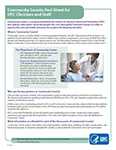Information for Healthcare Providers

This section of the website has tools and information about hemophilia for health care providers, including free educational materials to give to patients.
Universal Data Collection System
One of the major challenges facing researchers and scientists who work on rare disorders, such as hemophilia, is a lack of access to uniform health data. To address this issue and advance knowledge, CDC supported and coordinated a national public health monitoring project, the Universal Data Collection (UDC) system from 1998-2011.
UDC was conducted through a national network of specialized hemophilia treatment centers (HTCs). Through UDC a consistent set of health-monitoring data was collected from people with hemophilia and other bleeding disorders at hemophilia treatment centers
Community Counts aims to build and improve upon the UDC system, and collects information about common health issues, medical complications, and causes of death among people with bleeding disorders receiving care at HTCs.
To successfully carry out the Community Counts program, the Division of Blood Disorders has partnered with the American Thrombosis and Hemostasis Network and the United States Hemophilia Treatment Center Network.
UDC Database
View and print national and regional data on patients enrolled in the UDC program.
Fact Sheet for HTC Clinicians and Staff

This fact sheet is for HTC clinicians and staff to provide additional information on the Community Counts Registry for Bleeding Disorder Surveillance.
Hemophilia Treatment Centers
CDC supports a network of HTCs to provide comprehensive health management and prevention services. The centers use multi-disciplinary teams of health care specialists, state-of-the art clinical research programs, and outreach and education programs.
HTC Directory
Use the directory to search for the names and contact information of HTCs and staff, create lists, print mailing labels, and send emails. Healthcare providers might use this directory to find and consult with other experts in the field.
CDC Hemophilia A Mutation Project (CHAMP)
CDC is conducting the largest survey to date of people with hemophilia in the United States to identify the mutation ―or change in the gene that causes their hemophilia. During this study, CDC has also gathered a list of all of the mutations reported to cause hemophilia worldwide. More than 2,000 mutations have been reported for hemophilia A. The CHAMP project will store this and other lists in databases that will be available for researchers and health care providers to keep them informed on mutations that have been identified and how each mutation has affected the people reported to have it.
Learn how to accurately measure and collect joint range of motion for the Universal Data Collection (UDC) program. This video is intended for physical therapists or other health care providers at hemophilia treatment centers to use when they are collecting range of motion measurements.
Medical and Scientific Advisory Council (MASAC) Guidelines
The National Hemophilia Foundation formed a medical advisory council to advance clinical care and promote hemophilia research. This body establishes quality of care guidelines for the treatment of hemophilia and other bleeding disorders.
HANDI
HANDI (Hemophilia and AIDS/HIV Network for the Dissemination of Information) is a specialized health-based library and helpline service providing information and referrals about bleeding and clotting disorders. In addition to information on the unique medical issues faced by people with hemophilia and AIDS/HIV, HANDI addresses secondary conditions such as hepatitis C and joint disease as well as rare factor deficiencies and thrombophilia. CDC supports and funds HANDI through the National Hemophilia Foundation.
Data & Statistics
Find data and statistics related to hemophilia.
Research
Find a summary of CDC research on hemophilia.
Articles
Read CDC’s latest scientific articles on hemophilia.
- Page last reviewed: February 6, 2017
- Page last updated: February 27, 2017
- Content source:


 ShareCompartir
ShareCompartir